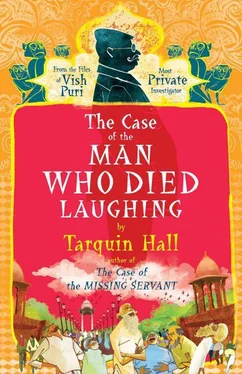Dr. Jha had described him in the past as a ‘fraud’, a ‘crook’, ‘David Blaine in saffron robes’. On numerous occasions he had also challenged Swami-ji’s claim to be able to cure the sick of cancer, diabetes and HIV/AIDS.
And then a month ago, the two men had finally come face-to-face when, unbeknownst to one another, they had been invited onto the same live TV talk show for what the host had billed as a ‘showdown’.
Seizing the opportunity to rail against Maharaj Swami before an audience of millions, Dr. Jha had angrily denounced him as a ‘charlatan’ who was swindling the public.
“You should be prosecuted as a common criminal,” he’d said, adding: “If you can levitate, show us now!”
With his equable, beatific smile, Swami-ji had calmly explained that he only performed miracles when ‘there is a purpose and a need’ and that such feats were designed to ‘inspire humanity to understand its true potential’. He’d also added that he was not ‘a circus performer’.
“Scientists seek to undermine our belief in the divine,” the guru had continued, fingering his Rudraksha rosary. “The power of the intellect and modern technology is insignificant compared to the power of love that each and every one of us carries in our hearts. At times, people must be reminded of this – they must be shown something truly miraculous. This helps to renew their faith. Thus within the month, I will perform a spectacular miracle that will leave no one – not even atheists like my friend Dr. Jha here – in any doubt about my powers.”
The talk show host had pressed the Godman to explain the nature of the ‘supernatural occurrence’ he had predicted, but Maharaj Swami had refused to elaborate. He had promised, however, that Dr. Jha would ‘be left speechless’.
Then yesterday the death threat had been delivered.
WHENEVER THERE IS A WITHERING OF THE LAW AND AN UPRISING OF LAWLESSNESS ON ALL SIDES, THEN I MANIFEST MYSELF.
FOR THE SALVATION OF THE RIGHTEOUS AND THE DESTRUCTION OF SUCH AS DO EVIL, FOR THE FIRM ESTABLISHING OF THE LAW, I COME TO BIRTH, AGE AFTER AGE.
UNBELIEVER! TOMORROW YOU DIE!
The Hindi words had been made up of letters cut from a newspaper and pasted onto a piece of paper.
Terrified, Dr. Jha’s wife had called the police. They in turn had advised her husband to stay indoors. But the Guru Buster had been determined to keep his regular early morning appointment.
* * *
Dr. Jha passed several other groups on the wide lawn that lay to the left of Rajpath: the first was a ladies’ yoga session, the supple participants arching their backs so that they looked like giant snails. Next, five bare-chested south Indian men were practicing the ancient Keralan martial art of Kalaripayat, the sound of their long wooden staves clattering against one another sounded like drumbeats. And finally, members of the local chapter of the Rashtriya Swayamsevak Sangh (RSS) were conducting their morning drill in Hitler Youth-style khaki uniforms.
In the past, Dr. Jha had challenged the RSS’s right to gather on Rajpath; in his view, the group presented a clear threat to public law and order no matter how much social work it carried out. The swayamsevaks had not taken kindly to his protests, and on a number of occasions there had been heated exchanges between them. But this morning the Guru Buster passed the ‘hate-mongering fascists’, as he had often referred to them, without incident.
A quarter of a mile farther on, in the shadow of a jamun tree, four men dressed for exercise were standing in a circle.
As Dr. Jha approached them, they raised their arms and stretched toward the sky. An instructor’s voice called out a command and they lowered their hands to their hips. Then all but one of the men tilted their heads back and began to laugh. Not a titter, chortle or snigger: they ejaculated heehaws like drunken men.
For ten seconds, they shook with infectious mirth, going abruptly silent as if the joke that had caused their collective amusement had suddenly lost its appeal. The instructor’s voice boomed out again and, with varying degrees of success and groans of discomfort, the men bent forward to touch their toes. Then they flung their arms wide and burst into another bout of joyful hysterics.
“Welcome, Dr. Sahib!” said the beaming instructor, Professor Pandey, who was in his late fifties. He had a big face surmounted by a shock of white hair partially stained yellow from smoking a pipe. “Welcome, welcome, welcome! We’re doing our warm-up! Join us!”
Dr. Jha, who had been a member of the Rajpath Laughing Club for two years, greeted the other men before taking his place in the circle.
“Unfortunately, there are only a few of us present today because so many people are away on holiday,” continued Professor Pandey.
The Laughing Club was usually attended by at least a dozen regulars. Their morning sessions were always noisy and rambunctious and there had been complaints from some of the other exercise groups, which was why they gathered so far down Rajpath.
“Now that we’re all assembled presently and correctly, good morning to you all!” said Professor Pandey.
“Good morning!” chorused the group.
“I’m delighted to see you, gentlemen!” The instructor carried on, grinning as he spoke. “First order of the day, we have a newcomer. Allow me to introduce Mr. Shivraj Sharma. Please make him welcome.”
“Good morning!” chorused the others with a round of applause.
“Mr. Sharma, what is your profession, please?” asked Professor Pandey, addressing the distinguished, middle-aged gentleman in the purple tracksuit.
“I’m a senior archaeologist with the Survey of India,” he answered haughtily.
“Very good, Mr. Sharma,” Professor Pandey said, smiling, as if he were talking to a child who had correctly recited his twelve-times table. “Now, you must know that here at the Laughing Club, we do laughter therapy. It’s a really wonderful approach that involves exercise and breathing as well as laughter, which is good for the heart and the soul. And what are we without heart and soul?”
There was a collective “Nothing!” from everyone except Mr. Sharma.
“Exactly! The ultimate goal of laughter therapy is to bring about world peace. People anywhere belonging to any culture can laugh. Laughter is the common language we all share. So how can we bring world peace through laughter? Very simple! When you laugh…”
Here the other men joined in again, chorusing: “You change. And when you change, the whole world changes with you!”
“Very good, very good, very good!” exclaimed Professor Pandey, addressing each part of the circle in turn. “So, Mr. Sharma, do you know what a jester is?”
Before the archaeologist could answer, the instructor continued: “He is a comedian and therefore laughs loudest of all. So let us now do jester laughter. On the count of three. One, two…”
On three, Professor Pandey pointed at the man opposite him in the circle, as if he had just told the funniest joke the world had ever heard, and started giggling feverishly.
The other men mimicked him, staggering about like intoxicated teenagers while holding their hands over their mouths.
Sharma tried his best to join in but looked awkward and self-conscious.
“Ho ho, ha-ha-ha! Ho ho, ha-ha-ha!” sang the group at the end of the Jester Exercise, doing a little jig and clapping their hands together.
“Very good, very good, very good!” cried Professor Pandey. “Next, Gibberish Exercise! What is gibberish, Mr. Sharma?”
The newcomer’s scowl suggested he was thinking: “Everything that comes out of your mouth!” But again Professor Pandey answered for him. “Gibberish is nonsense,” he said. “What infants speak.” He grinned again. “So let us now pretend we are two years old again.”
Читать дальше












